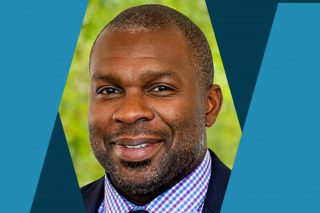Get Help Climbing the Career Ladder: Maurice Henderson’s Job Search Success Story

Share
Maurice Henderson spent the majority of his career climbing the career ladder in the public sector and serving the local community. In early 2019, Maurice made the move to the private sector and joined the team at Bird Rides Inc. Maurice says he discovered this new opportunity and made the shift with help from a strong network of professional relationships and referrals from contacts on LinkedIn. As Maurice puts it, “It’s great to have people helping you climb the career ladder but you’ll really need someone there to catch you in case you ever stumble.” Read on for Maurice’s job search resources, networking advice, and how he made the decision to leave the public sector.
What do you do for a career? Who do you work for?
Nearly my entire professional career has been spent working towards providing equitable access to opportunities for people often left behind by status quo thinking.
Previously, I’ve done this as an educator, working in the public sector (e.g. Virginia Governor’s office, Portland Mayor’s office), advocating for working people under the banner of organized labor, or on the campaign trail fighting for individuals and causes. Most recently, I do so through my work in the Smart Cities arena.
I started at Bird Rides Inc. in February 2019 as Director of Government Partnerships for the Western United States, and am excited to continue this work to provide full access to mobility options for everyone.
How long did it take you to find this job?
I was not pursuing a new opportunity but when this role was presented, it only took some key targeted conversations over a short couple months to lead to a job offer.
How did you find your job? What resources did you use? What tool or tactic helped the most?
In this case, I found my position through personal contacts. The process started through a query to a friend on LinkedIn. The best tool for me was my personal network that allowed me to tap into multi-level connections for guidance and support throughout the process.
What was the most difficult part of your job search? How did you overcome this challenge?
I did not have a particularly difficult experience finding the job. In fact, the process was fairly painless in comparison to other positions that I’ve been recruited for in the past.
The difficulty for me was the decision to leave the public sector after spending a large portion of my professional career in service to the public. There was also a unique mentorship opportunity with my former boss that I would forgo based on that decision. Thankfully that relationship remains strong and I am now in an industry that still supports the public good.
After some deliberation and consultation with trusted individuals in my network, I felt strongly about the values that Bird represents as a company that is dedicated to bringing safe, data supported, low-cost, environmentally-friendly mobility solutions to communities across the globe with a specific focus on addressing the needs of people in cities.
What is the single best piece of advice you would offer other job-seekers?
Never underestimate the strength and reach of your network. And spend time making lasting and meaningful connections with people.
Job searches are generally pretty humbling experiences, so remember to treat people with the dignity and respect they deserve. It’s great to have people helping you climb the career ladder but you’ll really need someone there to catch you in case you ever stumble.
Why do you love your job?
First, if you’re fortunate enough to work with great people, it makes every job worthwhile. So far, my experience has been that the team at Bird is top-notch. Second, I’m passionate about the work that we’re doing to expand mobility options that are environmentally friendly, aren’t cost prohibitive, and in this case, are fun. Bird also has the real potential to unlock the power of data to support and shape future policy to help metropolitan transportation networks solve problems in a more focused way for people, not strictly for cars.